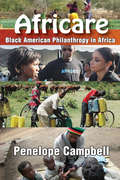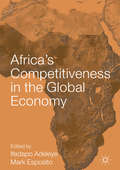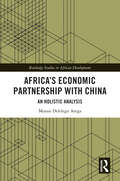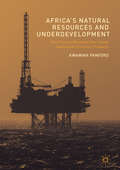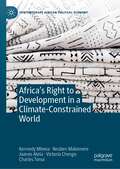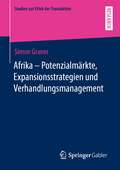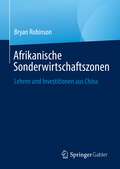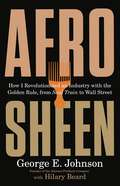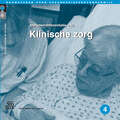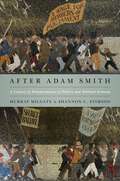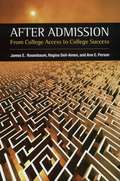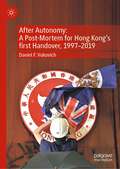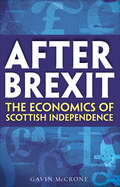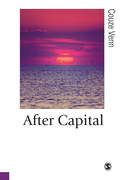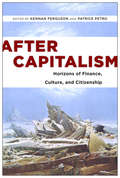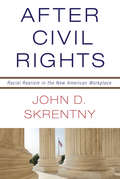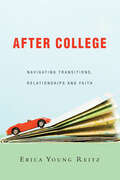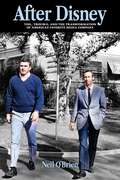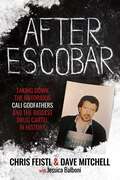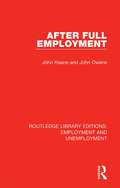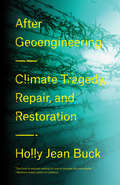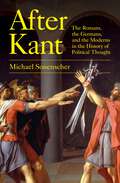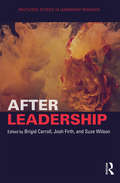- Table View
- List View
Africare: Black American Philanthropy in Africa
by Penelope CampbellAfricare is a US-based non-profit organization specializing in development aid for Africa. It is also the oldest and largest African-American led organization in the development field. Since its founding in 1970, Africare has delivered more than $710 million in assistance through over 2,500 projects to thirty-six African countries. The organization employs over 1,000 people, largely indigenous to the countries affected.This is a study in leadership and competing African and American black interests. Africare has sought to become the leading voice speaking on Africa within the US, a goal more difficult to attain than becoming the premier NGO in Africa. Sources of opinion and channels of expression about American policy in Africa are fragmented. They do not have name recognition or influential sponsors. There is poor coverage of African affairs in the US, except for key, often tragic, events. Africare has a heritage and has filled a niche in American society. Penelope Campbell argues that unless the organization reclaims these unique assets, it may lose the distinctiveness enabling its survival.The challenge for Africare is spreading its story and message. The author raises disturbing fundamental issues. Has foreign aid become such an industry that the patient is not allowed to get well? As the military cannot afford peace, it seems the world cannot afford the cessation of poverty. Campbell argues that success in Africa has been elusive not because of the failures of development organizations, but the magnitude of the issues involved. The author presents a convincing case for aid to Africa, the pitfalls involved, and for Africare's potential as a leader in meeting the continent's needs.
Africa’s Competitiveness in the Global Economy (Aib Sub-saharan Africa (ssa) Ser.)
by Ifedapo Adeleye Mark EspositoThis book highlights the key issues, opportunities and challenges facing African firms, industries, cities and nations in their quest to compete successfully in the global economy. Exploring a topic which has grown in importance as Africa faces a period of subdued economic development, this edited collection takes a unique multi-disciplinary, multi-industry and multi-country approach. The authors provide insights into a broad range of issues, including competitiveness measurement and evaluation, sectoral competitiveness of declining and emerging industries, threats of the 'Dutch Disease,' and talent competitiveness. This timely book offers a response to the urgent need for the diversification of economies and the advancement of manufacturing in Africa, appealing to scholars of international business and economics.
Africa’s Economic Partnership with China: An Holistic Analysis (Routledge Studies in African Development)
by Mussie Delelegn AregaThis book examines how increasing Africa-China relations in the fields of trade, development finance and investment have impacted productive capacities and structural economic transformation in sub-Saharan Africa (SSA). The book argues that statistical and empirical evidence shows that China’s influence has not substantially altered the fundamentals in Africa, and instead outlines a framework of policy conclusions and recommendations to help achieve transformational growth and development. Despite increased Chinese investments in transport, energy, communications, and manufacturing, sub-Saharan Africa is yet to see tangible economic and development benefits according to the multidimensional Productive Capacities Index (PCI). External trade is dogged by the same problems as during the colonial era, with primary commodities dominating exports to China, and industrial or manufacturing products dominating imports, thereby leaving the region exposed to external economic shocks. The book considers whether there are lessons to be learned from the experience of Asian countries such as Vietnam, proposing pragmatic, coordinated, non-ideological, and non-confrontational policy approaches to development. This book will be of interest to researchers, policymakers, advisors, academics, and practitioners with an interest in development in Africa, and China’s increasing role in the continent.
Africa’s Natural Resources and Underdevelopment: How Ghana’s Petroleum Can Create Sustainable Economic Prosperity
by Kwamina PanfordThis book explores how African countries can convert their natural resources, particularly oil and gas, into sustainable development assets. Using Ghana, one of the continent's newest oil-producing countries, as a lens, it examines the "resource curse" faced by other producers - such as Nigeria, Angola, and Equatorial Guinea - and demonstrates how mismanagement in those countries can provide valuable lessons for new oil producers in Africa and elsewhere. Relying on a broad range of fieldwork and policymaking experience, Panford suggests practical measures for resource-rich developing countries to transform natural resources into valuable assets that can help create jobs, boost human resources, and improve living and working conditions in Ghana in particular. He suggests fiscal, legal, and environmental antidotes to resource mismanagement, which he identifies as the major obstacle to socioeconomic development in countries that have historically relied on natural resources.
Africa’s Right to Development in a Climate-Constrained World (Contemporary African Political Economy)
by Kennedy Mbeva Reuben Makomere Joanes Atela Victoria Chengo Charles TonuiThis book examines how Africa can secure a ‘just transition’ to low-carbon, climate-resilient economies.
Afrika - Potenzialmärkte, Expansionsstrategien und Verhandlungsmanagement (Studien zur Ethik der Transaktion)
by Simon GranerDiese Dissertation befasst sich mit dem Thema einer Expansion nach Afrika und beleuchtet alle polydimensionalen Transaktionen, die hinsichtlich der Auswahl möglicher afrikanischer Potenzialmärkte, adäquater Expansionsstrategien und lokalem Verhandlungsmanagement notwendig sind.Die Forschungsfragen, die diesbezüglich beantwortet werden, sind: Welches sind die afrikanischen Länder, mit denen es sich aktuell und in Zukunft lohnt Geschäfte zu machen? Mit welchen Strategien kann ein expansionswilliges Unternehmen aus Deutschland oder Europa auf den afrikanischen Kontinent expandieren und in Afrika weiter wachsen? Wie sollen Geschäfte in den Expansionsländern eingefädelt und abgewickelt werden, um nachhaltigen Geschäftserfolg in Afrika zu erzielen? Welche kulturellen und ethischen Aspekte sind notwendig?Durch praktische Werkzeuge, die die theoretischen Ausarbeitungen abrunden, verliert diese Dissertation nie an Aktualität und kann auch in Zukunft branchen- und unternehmensindividuell genutzt werden.
Afrikanische Sonderwirtschaftszonen: Lehren und Investitionen aus China
by Bryan RobinsonDieses Buch bewertet afrikanische Sonderwirtschaftszonen aus einer Perspektive der Lehren und Erfahrungen, die China mit solchen Zonen gemacht hat, deren Auswirkungen auf die chinesische Politik und auf Investitionen.Unter Verwendung von Fallstudien über als erfolgreich wahrgenommene Sonderwirtschaftszonen in China, wird das chinesische Modell dieser Zonen als Bewertungs- und Benchmarking-Instrument vorgeschlagen, mit dem afrikanische Sonderwirtschaftszonen verglichen werden.Anhand mehrerer Fallstudien zu afrikanischen Sonderwirtschaftszonen wird im Buch die Wettbewerbsfähigkeit dieser mit besonderem Augenmerk auf die Anwerbung chinesischer Investoren für diese Zonen untersucht. Die wirtschaftlichen, sozialen und ökologischen Auswirkungen dieser Zonen werden bewertet. Die Bemühungen afrikanischer Staaten erfolgreiche Sonderwirtschaftszonen zu ermöglichen oder dies nicht zu tun, werden kritisch analysiert.Schließlich werden die Sonderwirtschaftszonen in Afrika mit dem chinesischen Modell verglichen, und es wird ein afrikanisches Modell für Sonderwirtschaftszonen vorgeschlagen. Es werden Empfehlungen an die Führung der afrikanischen Staaten sowie an chinesische Entscheidungsträger und Investoren gegeben, wie diese Zonen verbessert werden können, um die Wettbewerbsfähigkeit zu steigern und die Ziele der nachhaltigen Entwicklung der Zonen zu erreichen. Bryan Robinson ist wissenschaftlicher Mitarbeiter und Senior Lecturer an der Nelson Mandela University Business School, Port Elizabeth, Südafrika.Dieses Buch stellt die Übersetzung einer englischsprachigen Originalausgabedar. Die Übersetzung wurde mit Hilfe von künstlicher Intelligenz erstellt (maschinelle Übersetzung mit DeepL.com). Eine anschließende manuelle Überarbeitung erfolgte vor allem nach inhaltlichen Gesichtspunkten, so dass sich das Buch stilistisch von einer herkömmlichen Übersetzung abweicht.
Afro Sheen: How I Revolutionized an Industry with the Golden Rule, from Soul Train to Wall Street
by George E JohnsonThe inspiring and resilient story of George E. Johnson, creator of the iconic Afro Sheen and the first Black-owned company to be traded on Wall Street You might already be familiar with Afro Sheen and Ultra Sheen, but have you heard of the man behind the company that produced these products? In Afro Sheen, George Ellis Johnson, the acclaimed self-made businessman, reveals his inspiring and captivating rise from humble beginnings to the top of the haircare industry. At just twenty-seven years old, Johnson created the Johnson Products Company. JPC was the first Black-owned company to trade on a major stock exchange, became the financial sponsor of Soul Train, and was once considered the largest Black-owned manufacturing company in the world. At the height of its success, JPC was worth $37 million (over $225 million today). In this coming-of-age story, Johnson uses the life skills and strong character built from working odd jobs as a teenager and practicing the Golden Rule to create a business that both nurtures and advances the Black community. Without a formal education, he filled a gap in the Black haircare industry and created a high-quality formula for straightening hair and the iconic Ultra Sheen and Afro Sheen products that supported Black people in expressing their authentic beauty. For decades, Johnson has been an inspiration to Black entrepreneurs, setting an example of Black wealth and providing a safe space for Black people to work. Afro Sheen is a timely, impassioned look at both an industry and cultural moment. Johnson&’s impact is finally on full display, as he brilliantly highlights how having perseverance and a daring vision can create both change and a lasting legacy.
Afstudeerdifferentiatie 412 Klinische zorg: Niveau 4
by Hanny Sluis Jan H.J. JongDit katern is geschreven voor BOL- en BBL-studenten die in de laatste fase zijn gekomen van de opleiding tot verpleegkundige. Het katern is een hulpmiddel bij het afstuderen en reikt verschillende mogelijkheden voor binnen en buitenschoolse verdieping aan. In het eerste hoofdstuk wordt de voorbereiding op de differentiatie belicht. In hoofdstuk 2 leert de student een eigen opfrisschema samen te stellen. Daarmee kan hij of zij de eerder eigen gemaakte leerstof die nodig is voor de differentiatie weer op een rijtje zetten en gebruiken als basis voor de verdieping. Tevens bevat dit hoofdstuk een uitgebreide lijst van informatiebronnen. In hoofdstuk 3 zijn casussen opgenomen die dienen als basis om te verdiepen en als leidraad voor het afstudeerproces en product.
After 9/11: Solutions For A Saner World
by Don Hazen Tate Hausman Tamara Straus Michelle ChiharaEssays, from the progressive point of view, on various aspects of the 9/11 events, their causes, aftermath and what to do so that all may live in a safer, saner world in the future.
After Adam Smith: A Century of Transformation in Politics and Political Economy
by Shannon C. Stimson Murray MilgateHow writers after Adam Smith helped shape our thinking about economics and politicsFew issues are more central to our present predicaments than the relationship between economics and politics. In the century after Adam Smith's Wealth of Nations the British economy was transformed. After Adam Smith looks at how politics and political economy were articulated and altered. It considers how grand ideas about the connections between individual liberty, free markets, and social and economic justice sometimes attributed to Smith are as much the product of gradual modifications and changes wrought by later writers.Thomas Robert Malthus, David Ricardo, James Mill, John Stuart Mill, and other liberals, radicals, and reformers had a hand in conceptual transformations that culminated in the advent of neoclassical economics. The population problem, the declining importance of agriculture, the consequences of industrialization, the structural characteristics of civil society, the role of the state in economic affairs, and the possible limits to progress were questions that underwent significant readjustments as the thinkers who confronted them in different times and circumstances reworked the framework of ideas advanced by Smith—transforming the dialogue between politics and political economy. By the end of the nineteenth century an industrialized and globalized market economy had firmly established itself. By exploring how questions Smith had originally grappled with were recast as the economy and the principles of political economy altered during the nineteenth century, this book demonstrates that we are as much the heirs of later images of Smith as we are of Smith himself.Many writers helped shape different ways of thinking about economics and politics after Adam Smith. By ignoring their interventions we risk misreading our past—and also misusing it—when thinking about the choices at the interface of economics and politics that confront us today.
After Admission: From College Access to College Success
by James E. Rosenbaum Ann E. Person Regina Deil-AmenEnrollment at America’s community colleges has exploded in recent years, with five times as many entering students today as in 1965. However, most community college students do not graduate; many earn no credits and may leave school with no more advantages in the labor market than if they had never attended. Experts disagree over the reason for community colleges’ mixed record. Is it that the students in these schools are under-prepared and ill-equipped for the academic rigors of college? Are the colleges themselves not adapting to keep up with the needs of the new kinds of students they are enrolling? In After Admission, James Rosenbaum, Regina Deil-Amen, and Ann Person weigh in on this debate with a close look at this important trend in American higher education. After Admission compares community colleges with private occupational colleges that offer accredited associates degrees. The authors examine how these different types of institutions reach out to students, teach them social and cultural skills valued in the labor market, and encourage them to complete a degree. Rosenbaum, Deil-Amen, and Person find that community colleges are suffering from a kind of identity crisis as they face the inherent complexities of guiding their students towards four-year colleges or to providing them with vocational skills to support a move directly into the labor market. This confusion creates administrative difficulties and problems allocating resources. However, these contradictions do not have to pose problems for students. After Admission shows that when colleges present students with clear pathways, students can effectively navigate the system in a way that fits their needs. The occupational colleges the authors studied employed close monitoring of student progress, regular meetings with advisors and peer cohorts, and structured plans for helping students meet career goals in a timely fashion. These procedures helped keep students on track and, the authors suggest, could have the same effect if implemented at community colleges. As college access grows in America, institutions must adapt to meet the needs of a new generation of students. After Admission highlights organizational innovations that can help guide students more effectively through higher education.
After Autonomy: A Post-Mortem for Hong Kong’s first Handover, 1997–2019
by Daniel F. VukovichThis book offers a sharp, critical analysis of the rise and fall of the 2019 anti-extradition bill movement in Hong Kong, including prior events like Occupy Central and the Mongkok Fishball Revolution, as well as their aftermaths in light of the re-assertion of mainland sovereignty over the SAR. Reading the conflict against the grain of those who would romanticize it or simply condemn it in nationalistic fashion, Vukovich goes beyond mediatized discourse to disentangle its roots in the Basic Law system as well as in the colonial and insufficiently post-colonial contexts and dynamics of Hong Kong. He examines the question of localist identity and its discontents, the problems of nativism, violence, and liberalism, the impossibility of autonomy, and what forms a genuine de-colonization can and might yet take in the city. A concluding chapter examines Hong Kong’s need for state capacity and proper, livelihood development, in the light of the Omicron wave of the Covid pandemic, as the SAR goes forward into a second handover era.
After Brexit: The Economics of Scottish Independence
by Gavin McCronePressure for independence remains a major force in Scotland, but the case for it has changed substantially since the referendum of 2014. In the 2016 Brexit referendum, 60 per cent of the Scottish electorate voted to remain part of the European Union– the only part of the UK to reject Brexit so unequivocally. This new analysis takes into account a host of economic issues including deficit, debt, currency, energy (including North Sea oil and gas), pensions, mortgages and the financial sector. It weighs up the advantages of rejoining the EU single market, either as a full EU member or as a member of the EEA, with the disadvantages of a hard border with the rest of the UK. Independence would create opportunities, but it would also bring many thorny problems which the Scottish government, and the Scottish people, would have to face.
After Capital (Published in association with Theory, Culture & Society)
by Couze VennThe present crisis of capitalism has a history. A history of the private accumulation of wealth through property regimes which allow increasing commodification and the privatisation of resources: from land to knowledge and even to life itself. Understanding that history may allow us to imagine alternatives after Capital which are no longer private but common. After Capital explores this history, showing how the economy is linked to environmental damage, climate change, resource depletion, and to massive inequality. It takes the reader from liberalism to neoliberalism, from climate change to the Anthropocene, and shows how this history is inextricably the history of colonialism. It is a rich and detailed narrative of capitalism over the last 200 years, that explains its texture and its neoliberal endgame. This discussion frames speculation on what postcapitalist societies could be, with regimes of private accumulation replaced by a politics and ethics of a democratic and ecologically- grounded Commons.
After Capitalism: Horizons of Finance, Culture, and Citizenship
by Andrew Ross A. Aneesh Geoff Mann Marcus Bullock Jeffrey Sommers Sherryl Vint Bernard C. Perley Cristina Venegas Esther Leslie Kennan Ferguson Niki Akhavan Patrice Petro Ivan AscherFrom Thomas Piketty to David Harvey, scholars are increasingly questioning whether we are entering into a post-capitalist era. If so, does this new epoch signal the failure of capitalism and emergence of alternative systems? Or does it mark the ultimate triumph of capitalism as it evolves into an unstoppable entity that takes new forms as it engulfs its opposition? After Capitalism brings together leading scholars from across the academy to offer competing perspectives on capitalism's past incarnations, present conditions, and possible futures. Some contributors reassess classic theorizations of capitalism in light of recent trends, including real estate bubbles, debt relief protests, and the rise of a global creditocracy. Others examine Marx's writings, unemployment, hoarding, "capitalist realism," and coyote (trickster) capitalism, among many other topics. Media and design trends locate the key ideologies of the current economic moment, with authors considering everything from the austerity aesthetics of reality TV to the seductive smoothness of liquid crystal. Even as it draws momentous conclusions about global economic phenomena, After Capitalism also pays close attention to locales as varied as Cuba, India, and Latvia, examining the very different ways that economic conditions have affected the relationship between the state and its citizens. Collectively, these essays raise provocative questions about how we should imagine capitalism in the twenty-first century. Will capitalism, like all economic systems, come to an end, or does there exist in history or elsewhere a hidden world that is already post-capitalist, offering alternative possibilities for thought and action?
After Civil Rights: Racial Realism in the New American Workplace
by John D. SkrentnyA provocative new approach to race in the workplaceWhat role should racial difference play in the American workplace? As a nation, we rely on civil rights law to address this question, and the monumental Civil Rights Act of 1964 seemingly answered it: race must not be a factor in workplace decisions. In After Civil Rights, John Skrentny contends that after decades of mass immigration, many employers, Democratic and Republican political leaders, and advocates have adopted a new strategy to manage race and work. Race is now relevant not only in negative cases of discrimination, but in more positive ways as well. In today's workplace, employers routinely practice "racial realism," where they view race as real—as a job qualification. Many believe employee racial differences, and sometimes immigrant status, correspond to unique abilities or evoke desirable reactions from clients or citizens. They also see racial diversity as a way to increase workplace dynamism. The problem is that when employers see race as useful for organizational effectiveness, they are often in violation of civil rights law.After Civil Rights examines this emerging strategy in a wide range of employment situations, including the low-skilled sector, professional and white-collar jobs, and entertainment and media. In this important book, Skrentny urges us to acknowledge the racial realism already occurring, and lays out a series of reforms that, if enacted, would bring the law and lived experience more in line, yet still remain respectful of the need to protect the civil rights of all workers.
After College: Navigating Transitions, Relationships and Faith
by Erica Young Reitz"The first year out was one of the hardest years of my life." —Curt
After Disney: Toil, Trouble, and the Transformation of America's Favorite Media Company
by Neil O'BrienThe untold succession struggle at Walt Disney Productions following the death of its founder, and the generational transformation which led to the birth of the modern multibillion-dollar animation industry.Walt Disney left behind big dreams when he died in 1966. Perhaps none was greater than the hope that his son-in-law, Ron Miller, would someday run his studio. Under Miller&’s leadership, Disney expanded into new frontiers: global theme parks, computer animation, cable television, home video, and video games. Despite these innovations, Ron struggled to expand the Disney brand beyond its midcentury image of wholesome family entertainment, even as times and tastes evolved. Tensions between Miller and Walt&’s nephew, Roy E. Disney, threatened to destroy the company, leading Wall Street &“Gordon Gekko&” types to come after Mickey Mouse. At the same time, the aging Animation Department—once the core of Walt&’s business—was one memo away from shutting down forever. Rather, thanks to the radical efforts of Walt&’s veterans to recruit and nurture young talent, it was revived by this sudden influx of artists who would go on to revolutionize the film industry. Additionally, this new generation would prove over time that animation was so much more than just kids&’ stuff—it was a multibillion dollar industry. This is the upstairs-downstairs story of the executives and animators who clashed and collaborated to keep America&’s most storied company alive during the most uncertain period in its one hundred year history.
After Escobar
by Dave Mitchell Chris Feistl Jessica BalboniRenowned DEA agents Chris Feistl and Dave Mitchell tell the incredible true story of how they helped dismantle the world&’s single most powerful crime syndicate, as featured in Season 3 of the hit Netflix series Narcos.By the early 1990s, Colombia&’s Cali cartel had become what the former head of the DEA Thomas Constantine referred to as &“The biggest and most powerful crime syndicate in history.&” Responsible for nearly 85% of the cocaine that reached U.S. soil and 90% worldwide, they were untouchable, earning billions of dollars all while maintaining their reputation as &‘The Godfathers of Cali&” and brazenly corrupting thousands of Colombian authorities and government officials, even &“buying&” the outcome of the 1994 presidential election. In 1994, the DEA sent young operatives Chris Feistl and Dave Mitchell to Colombia with one formidable task: help Colombian authorities take down the ruthless leaders of the brutal Cali cartel. Not any easy job for two men who looked more like tall, lanky surfers than DEA agents: standing well over six feet tall and only six years removed from the DEA Academy, they were the epitome of conspicuous in a city where most residents rarely, if ever, saw an American in person. Many of their colleagues feared for their safety, openly questioning their ability to blend in. Their almost three-year journey would lead them from the bureaucratic halls of the U.S. Embassy to the violent streets of Cali and deep into its rural sugar cane fields, on high alert day and night as they dodged deadly cartel assassins and oftentimes worked unilaterally to battle the unprecedented corruption within Colombia&’s security forces. Over time their relentless efforts began to slowly degrade the godfathers&’ defenses and weaken their infrastructure.
After Full Employment (Routledge Library Editions: Employment and Unemployment #4)
by John Keane John OwensFirst published in 1986. This book analyses, at an introductory level, the four main and competing political interpretations of the cause of unemployment and the future of paid work – social democracy, free market liberalism, the disciplinary state, and utopian socialism. Considered together these four interpretations are highly revealing – and challenging. They raise considerable doubts about the viability or desirability of policies design to ‘get the jobless back to work’. Keane and Owens’ central argument is that the post-war policy of full male employment, as well as its politic, economic and social preconditions, are not repeatable, Starting with Keynes and Beveridge, they explain how and why full employment welfare states developed in Britain and the US, and how they had in turn been replaced by the ‘strong state, free market’ programmes of Thatcher and Reagan. By focusing on an issue which was, and still is, at the heart of political debate, the book provides a lucid and approachable guide to four key strands of political thought it Britain and the US. It will be an ideal introductory text for students of politics, sociology and economics.
After Geoengineering: Climate Tragedy, Repair, and Restoration
by Holly Jean BuckWhat if the people seized the means of climate production?Climate engineering is a dystopian project. But as the human species hurtles ever faster towards its own extinction, geoengineering as a temporary fix, to buy time for carbon removal, is a seductive idea. We are right to fear that geoengineering will be used to maintain the status quo, but is there another possible future after geoengineering? Can these technologies and practices be used as technologies of repair, to bring carbon levels back down to pre-industrial levels? Are there possibilities for massive intentional intervention in the climate that are democratic, decentralized, or participatory? Is there a scenario where the people can define and enact geoengineering on our own terms? These questions are provocative, because they go against a binary that has become common sense: geoengineering is assumed to be on the side of industrial agriculture, inequality and ecomodernism, in opposition to degrowth, renewable energy, sustainable agriculture and climate justice. After Geoengineering rejects this binary, to ask: what if the people seized the means of climate production? Both critical and utopian, the book examines the possible futures after geoengineering. Rejecting the idea that geoengineering is some kind of easy work-around, Holly Buck outlines the kind of social transformation that would be necessary to enact a programme of geoengineering in the first place.
After Greenwashing
by Frances BowenBusinesses promote their environmental awareness through green buildings, eco-labels, sustainability reports, industry pledges and clean technologies. When are these symbols wasteful corporate spin, and when do they signal authentic environmental improvements? Based on twenty years of research, three rich case studies, a strong theoretical model and a range of practical applications, this book provides the first systematic analysis of the drivers and consequences of symbolic corporate environmentalism. It addresses the indirect cost of companies' symbolic actions and develops a new concept of the 'social energy penalty' - the cost to society when powerful corporate actors limit the social conversation on environmental problems and their solutions. This thoughtful book develops a set of tools for researchers, regulators and managers to separate useful environmental information from empty corporate spin, and will appeal to researchers and students of corporate responsibility, corporate environmental strategy and sustainable business, as well as environmental practitioners.
After Kant: The Romans, the Germans, and the Moderns in the History of Political Thought
by Michael SonenscherTracing the origins of modern political thought through three sets of arguments over history, morality, and freedomIn this wide-ranging work, Michael Sonenscher traces the origins of modern political thought and ideologies to a question, raised by Immanuel Kant, about what is involved in comparing individual human lives to the whole of human history. How can we compare them, or understand the results of the comparison? Kant’s question injected a new, future-oriented dimension into existing discussions of prevailing norms, challenging their orientation toward the past. This reversal made Kant’s question a bridge between three successive sets of arguments: between the supporters of the ancients and moderns, the classics and romantics, and the Romans and the Germans. Sonenscher argues that the genealogy of modern political ideologies—from liberalism to nationalism to communism—can be connected to the resulting discussions of time, history, and values, mainly in France but also in Germany, Switzerland, and Britain, in the period straddling the French and Industrial revolutions.What is the genuinely human content of human history? Everything begins somewhere—democracy with the Greeks, or the idea of a res publica with the Romans—but these local arrangements have become vectors of values that are, apparently, universal. The intellectual upheaval that Sonenscher describes involved a struggle to close the gap, highlighted by Kant, between individual lives and human history. After Kant is an examination of that struggle’s enduring impact on the history and the historiography of political thought.
After Leadership (Routledge Studies in Leadership Research)
by Brigid Carroll Suze Wilson Josh FirthLeadership studies today resembles a bewildering diversity of theories, concepts, constructs and approaches, struggling in huge part for meaning, relevance and impact. As Dennis Tourish so eloquently puts it, much of the literature suffers from ‘unrelenting triviality’ and ‘sterile preoccupations’. Seeking to create a clean break from this current state of leadership studies, After Leadership begins with the premise of a post-apocalyptic world where only fragments of ‘leadership science’ now remain, echoing Alisdair McIntyre’s imagining of such a scene as the basis for re-establishing the foundations and focus of moral theory. From these fragments, the authors seek to construct a new leadership studies that challenges much of the established thinking on leadership, exposes its limitations and biases, and, most importantly, seeks to construct the foundations of a more inclusive, participatory, bold, relational and social platform for leadership in the future. After Leadership thus imagines a brave new world where what leadership is and what we seek from it can be developed anew, rather than remaining bound up in the problematic traditions and preoccupations that characterise leadership studies today. Offering both full length chapter explorations that explore new ways of understanding and practicing leadership, as well as shorter essays that aim to provoke further reflection on leadership and what we seek of it, After Leadership offers a uniquely critical and creative collection that will inspire students, scholars and leadership educators to reconsider their understanding and practice of leadership.
